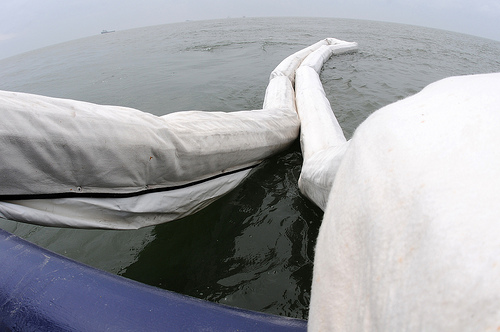BP: “This was not our accident”
 In the middle of potentially America’s worst environmental disaster, BP is attempting to squarely shift the blame for the Deepwater Horizon disaster from itself to Transocean.
In the middle of potentially America’s worst environmental disaster, BP is attempting to squarely shift the blame for the Deepwater Horizon disaster from itself to Transocean.
As BP’s CEO Tony Hayward prepares to meet key Congressmen in Washington today, you can see part of BP‘s PR strategy in play with the simple message: We are not to blame, although we will clean up the mess.
Speaking on the BBC yesterday, Hayward said: “This was not our accident … This was not our drilling rig. This was not our equipment. It was not our people, our systems or our processes. This was Transocean’s rig. Their systems. Their people. Their equipment.”
But evidence suggests otherwise:
We already know that a key remote control acoustic safety device was not being used on the rig;
We know that BP “ spent years battling federal regulators over how many layers of safeguards would be needed to prevent a deepwater well from this type of accident”.
In a letter sent last year to the Department of the Interior, BP objected to what it called “extensive, prescriptive regulations” proposed in new rules to toughen safety standards. “We believe industry’s current safety and environmental statistics demonstrate that the voluntary programs … continue to be very successful.”
But this was not the only crucial equipment that was missing:
One BP worker has now said the company had chosen not to install another deep-water valve that would have been placed about 200 feet under the sea floor, which could have acted as a blowout preventer.
One worker who was on the oil rig at the time of the explosion has said the rig had been drilling deeper than 22,000 feet, even though the company’s federal permit allowed it to go only 18,000 to 20,000 feet deep, although this is denied by BP.
BP is also in denial about the success of BP’s response to the spill. “We have contained the oil in the offshore”, said Hayward, calling the response plan “a success”.
He went on to add that “There is today no oil on the shore, there is no oil forecast to be on the shore.”
This is in complete contrast to news stories that have oil already washed up on the shore and maps plotting the course of the main spill expecting it to hit land today.
And even if the wind changes and much of the oil stays at sea, this is hardly good news. Jacqueline Savitz, a senior scientist at Oceana, a nonprofit environmental group, argues “Some people are saying, it hasn’t gotten to shore yet so it’s all good.”
She continues: “But a lot of animals live in the ocean, and a spill like this becomes bad for marine life as soon as it hits the water. You have endangered sea turtles, the larvae of bluefin tuna, shrimp and crabs and oysters, grouper. A lot of these are already being affected and have been for 10 days. We’re waiting to see how bad it is at the shore, but we may never fully understand the full impacts on ocean life.”
So when Congressmen grill Hayward later today, they should grill him over BP’s record of trying to oppose enhanced safety features on the rigs.
They should grill him about putting profit over safety and the environment.
Brent Coon, a lawyer who sued BP over a previous deadly oil facility explosion, is now representing a 24-year-old roustabout who was working on the rig at the time of the blast.
“BP stands apart, heads and shoulders above all the rest of them, with respect to their conduct,” argues Coon. “It’s like they just don’t care.”
So Mr. Hayward it is your accident.
And no matter what you think, the public rightly believes you are to blame.
